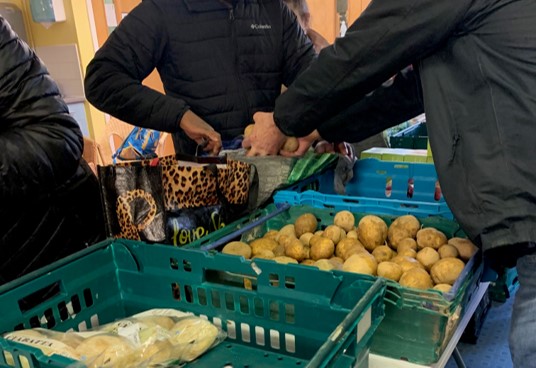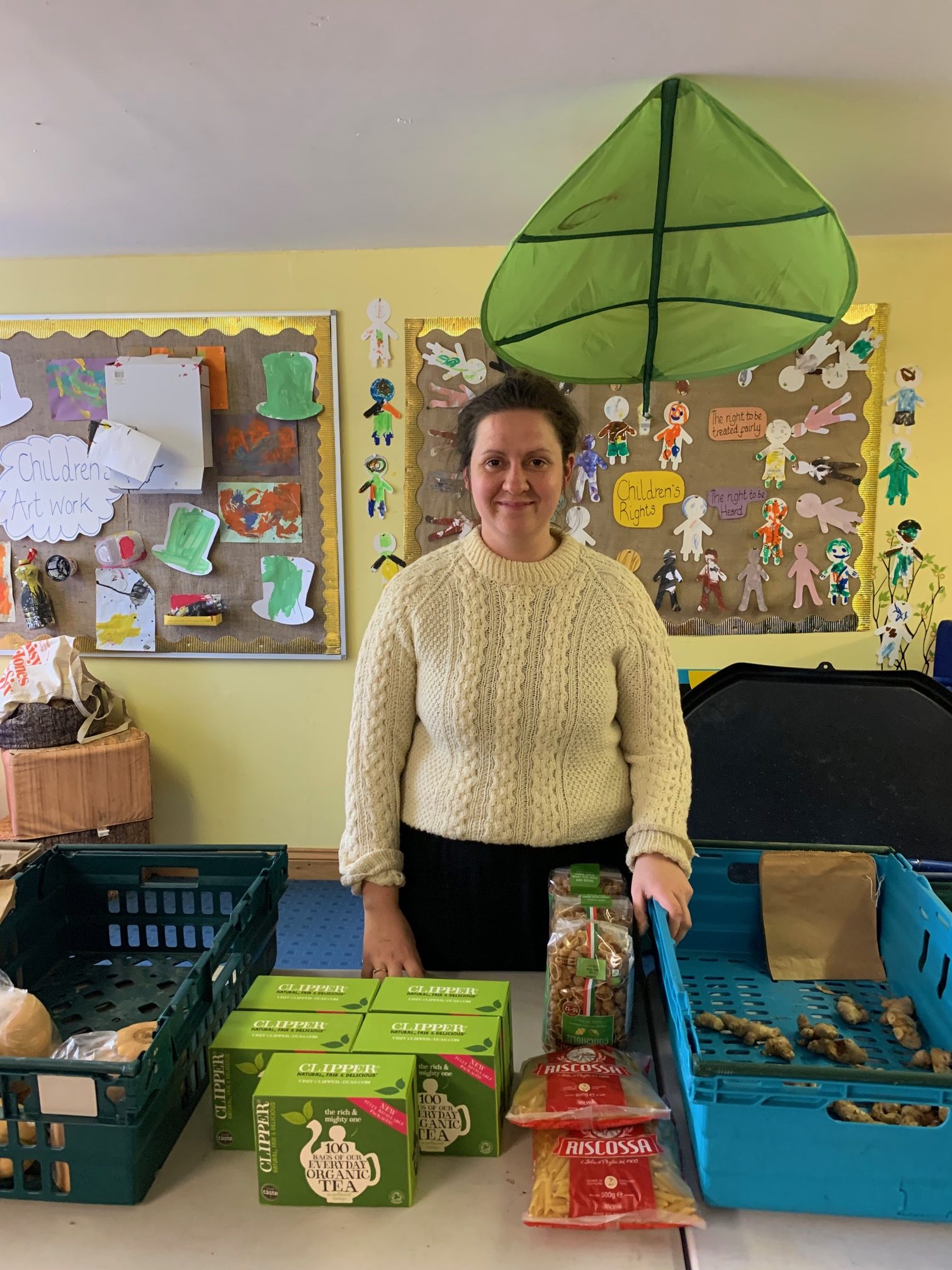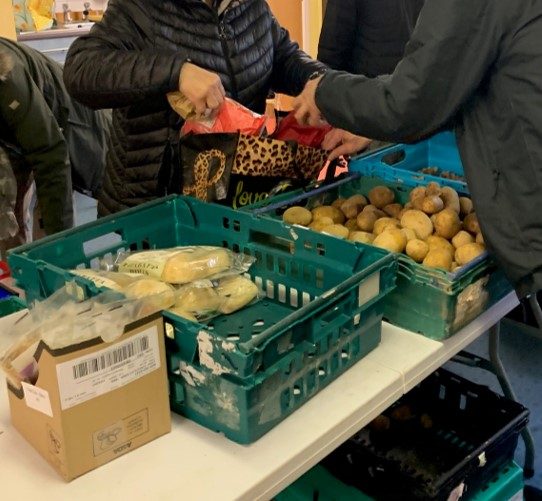A visit to the food club
The cost-of-living crisis is affecting large parts of the country. With many people struggling to keep up with the rising costs of food, there has a been a significant increase not just in people using food banks but choosing to use food clubs.
We have one at Wellspring Settlement, and it’s a source of great help and support to many residents. We popped along to meet the workers, volunteers, and some residents who access the service.
Started during lockdown, the Wellspring Settlement Food Club is open every week and provides varied and nutritious food for all. At a cost of £1 per year to join, members get to buy a weekly food box for just £3.50. Food boxes are crammed with everything from fresh vegetables to meat products, breakfast cereal to tinned food. Halal, veggie and vegan options are available too.
The food club started as part of a wider programme called Family Action, and can act as a route into other Wellspring Settlement services, with opportunities to grow food in the garden, cooking classes, and referrals the BOOST project if people are experiencing financial hardship.
Heather from Family Action said: “We have food clubs all over the city, and I work across a few. And I am someone who has experienced using food banks myself. I used to up on a Friday to one, and because I was out of work at the time I ended up asking if there were any jobs going.”
In the UK alone food prices have increased over the past 12 months, putting pressure on already stretched household budgets. Staple items such as sliced white bread and milk have gone up by around a third, and a cucumber by as much as 50%. Due to rising inflation and wages not being increased, food clubs are no longer just for the poorest in society, but a way many people top up their weekly shop.
With people falling on hard times, there can still be stigma attached to food banks and food clubs, and often some confusion between the two. Heather draws the distinction. She said: “A food club is very different to a food bank. You need a referral to use a food bank, and you can only use a food bank a couple of times a year, as it’s essentially an emergency service. A food club is an option that people can use to top up their shopping and can come again and again. People are paying for it.”
There is a different relationship between the food club and the member then, who is more like a customer. Wellspring Settlement’s Food Cub Co-ordinator, Harriet said: “The dynamic is different, they feel more entitled to the food as are paying and will often have opinions about the produce. Good and bad. Which we encourage and take on board.”
The produce looks great, and healthy. It’s not just any old cheap food. Nutrition is important and Harriet said: “With our selection we have usually got a variety of fruit and veg, and we sometimes do recipes as well. These show what ingredients people need to use when cooking a meal and can be part of the box they are given,” she added.
The Food Club is clearly far more than just handing out food. Various members arrive and load up their shopping bags. Some of these residents like to remain anonymous, and not make a fuss of attending, and club is understanding and sensitive to that. One person I spoke to was retelling her story of how she landed on difficult times and why was now using the service and burst into tears, overcome with emotion. She said: “I come regularly, and I am on Universal Credit as am looking after my mother who has dementia. I’m driving back and forth to her house and the petrol is a costing a fortune. Every time I try to get a job, she becomes more ill. It’s been really tough, so I needed this. I really did. Coming here is an absolute lifeline, it makes a massive difference to my life, it really does.”
These types of stories are not uncommon to staff and are being increasingly normalised. Harriet said: “It’s just incredibly stressful for people now. As you can see just asking people how they are can trigger an emotional response.
People find it hard to talk. There are a lot of people experiencing hardship now so some don’t really feel like their position is unusual or something they should be upset about.”
Slight budget changes can really push people over the edge, financially and indeed emotionally. She continued: “Small things like a boiler breaking or a car needing an MOT, any additional cost, can really spill over into turmoil and financial trouble for people. These tipping point issues, where not having any safety valve can push people into crisis.”
Another resident who lives locally and uses the food bank explains her current situation and said: “The amount of money for bills and gas and stuff has made it really tough lately. If this wasn’t here providing good, fresh, and healthy food I would very much be reduced to just having the bare basics really.”
Some people do feel slightly embarrassed, even ashamed to use the food club. Heather told me a story of one lady who lives in the flats over the road and desperately needed help but didn’t want anyone to spot her coming. She said: “But I told her we are all in the same boat, and we have good group of people, we are here to support you, so it’s nothing to be ashamed of at all.”
The same resident echoed this, and claimed: “For me they are brilliant here. All very friendly, and non-judgy, right from the start.
That’s important for me, as I don’t need to go to a foodbank, but it feels easier for me to go to a food club. The fact I am still paying for it makes a difference,” she added.

As more residents collected their shopping, there was a real atmosphere of warmth and friendliness, with people sharing their day and some having a cup of tea. There was a strong social element to this.
Harriet said: “‘At food banks people aren’t necessarily going to know your name, people aren’t coming back week after week like here. We do develop a relationship with the people that buy into the service so they recognise us and feel more welcome.
And if anyone gets upset, as you’ve just seen, we probably know them well enough offer them a cup of tea, sit down and have a chat. Which is important.”
When other issues sometimes arise, there are people on standby. Heather said: “Often other issues will pop up when people come, so we can offer support, and signpost people on if they have another need.
In our network across all the food clubs we will usually have support workers available, and people there to help with things like benefits or accessing health services. Coming for food can be a jumping off point for help with other challenges,” she added.
With the current financial situation unlikely to change anytime soon we may see this model of support increasing in the city and beyond. I wondered if the staff would like to see you a time when they are no longer needed, “Yes of course, that would mean society was where it needed to be.”
There are some real success stories though, where people have used the service and got back on their feet. Harriet said: “We have some people that get in contact and to say they’re now working, or have changed jobs, so don’t need to come anymore which is great. But also, some people get jobs and still feel they want to use it, which is also fine.”
To use the service, you don’t need to be on benefits, the main criteria is living within 15 minutes’ walk from the food club. This is about keeping the services local, but also about keeping food fresh.
Getting involved is a simple and straight forward process that removes any complication or stigma. Harriet explained: “You can get in touch beforehand, but the best way is to just turn up on the day really and fill out a form and you pay your £3.50 for a bag of shopping. There’s also a £1 membership fee which lasts you for a year, and then you come every week, or whenever you feel like you want or need to.”
The Wellspring Settlement Food Club takes place every Wednesday between 1pm and 3pm, at our Settlement Site, Ducie Road.
If you are interested in contacting the food club, you can get in touch with Harriet by email or on 0117 955 6971.



